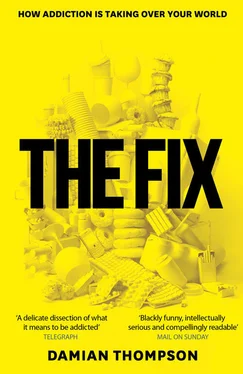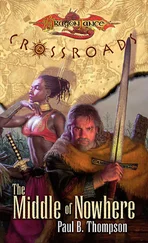Then something odd happens. Without warning, you develop an obsession with playing the machine. You stand in front of it from opening time until last orders, much to the bemusement of the other regulars. You know that the pub’s fruit machine is programmed to return only 80 per cent of the money you put into it, but one day you hit multiple jackpots that earn you £50. The thrill of this experience – and the possibility of it happening again – reinforces your new preoccupation. You are no longer thinking rationally.
Eventually the teasing from other patrons turns to alarm as they see you pouring away your pension. The pub landlord has ‘a quiet word’ and asks you to stop playing. You’re mortified and stop going to the pub – but, instead of finding another place to drink, you slip into your local betting shop, where the jackpots are bigger. Then a newspaper article about online gambling catches your eye and before long you are shutting yourself away in your study, steadily building up credit card bills as you accrue greater and greater losses. Your wife still doesn’t have a clue.
But your problems don’t end there. Somewhere along the line, much to your own surprise, you discover a taste for internet pornography. Under normal circumstances, porn would have no appeal – you’re 70 years old, after all. But even before you stumbled across these sites you had noticed that your sexual appetite had mysteriously reawakened.
This story sounds implausible, but something very much like it happened to several Parkinson’s patients recently. They developed gambling urges out of nowhere, and in certain cases these were accompanied by a revived sex drive. There were other permutations: patients experienced a revved-up sex drive without the gambling urges, or started binge eating. Some began shopping obsessively, perhaps combining it with other risk-taking activities. The common thread was the startling change in the behaviour of people who, until recently, had devoted most of their leisure time to tending their begonias.
But the culprit wasn’t the disease. It was the medication designed to reverse its symptoms. The medicine wasn’t supposed to produce those results, but the fact that it did so provides us with vital information about the strange, self-defeating behaviours that we call addictions.
These Parkinson’s patients had been given drugs that mimicked the action of dopamine. This is a neurotransmitter, or chemical messenger, that affects our experience of pleasure and also has the ability to map out new reward pathways in the brain – in other words, to rewire it.
That’s a trendy way of describing complex changes in the brain. This is arguably the most impenetrable subject human beings have ever tried to understand. Scientists who have devoted their careers to it admit that they have only pieced together a tiny section of the jigsaw. That’s frustrating – but bear with me, because what they have discovered has fascinating implications. Dopamine is an ancient mechanism: it’s found in lizards and every other animal along the evolutionary tree. It has been called the ‘pleasure chemical’ because it is released whenever we eat good food, enjoy sex or take pleasure-enhancing drugs.
Recently, scientists have refined their understanding of dopamine. They now think that it has more to do with desire than pleasure – or, to use the refreshingly simple terms that now loom large in scientific discussions of addiction, with wanting rather than liking.
In a series of experiments on the brains of rats, the psychologist Kent Berridge of the University of Michigan came to the conclusion that ‘wanting’ (desire) and ‘liking’ (pleasure) are separate urges controlled by different brain circuits in humans as well as animals. That is an important discovery that we need to keep at the back of our minds whenever we think about how and why we are behaving addictively.
Dopamine is involved in both brain circuits, but its main function is to stimulate wanting; liking is more affected by the opioid system, which contains endorphins, the brain’s natural morphine-like compounds. 2 Конец ознакомительного фрагмента. Текст предоставлен ООО «ЛитРес». Прочитайте эту книгу целиком, купив полную легальную версию на ЛитРес. Безопасно оплатить книгу можно банковской картой Visa, MasterCard, Maestro, со счета мобильного телефона, с платежного терминала, в салоне МТС или Связной, через PayPal, WebMoney, Яндекс.Деньги, QIWI Кошелек, бонусными картами или другим удобным Вам способом.
Of the two urges, wanting is more powerful. ‘The brain seems to be more stingy with mechanisms for pleasure than for desire,’ says Berridge. 3 Конец ознакомительного фрагмента. Текст предоставлен ООО «ЛитРес». Прочитайте эту книгу целиком, купив полную легальную версию на ЛитРес. Безопасно оплатить книгу можно банковской картой Visa, MasterCard, Maestro, со счета мобильного телефона, с платежного терминала, в салоне МТС или Связной, через PayPal, WebMoney, Яндекс.Деньги, QIWI Кошелек, бонусными картами или другим удобным Вам способом.
This helps us understand another apparently simple distinction made by scientists that we came across in Chapter 1 – between the Stop and Go impulses in the brain. The Go impulse tells us to reach out for an immediate reward; it’s ancient, it’s powerful and it’s shared with animals. As you might expect, it goes into overdrive at the prospect of food and sex. Dopamine and ‘wanting’ are central to this urge – but different levels of ‘liking’ also determine the strength of the Go message. 4 Конец ознакомительного фрагмента. Текст предоставлен ООО «ЛитРес». Прочитайте эту книгу целиком, купив полную легальную версию на ЛитРес. Безопасно оплатить книгу можно банковской картой Visa, MasterCard, Maestro, со счета мобильного телефона, с платежного терминала, в салоне МТС или Связной, через PayPal, WebMoney, Яндекс.Деньги, QIWI Кошелек, бонусными картами или другим удобным Вам способом.
The Stop impulse is highly developed only in humans. It helps us manage our Go impulse by spelling out the consequences of immediate reward. You could call it the voice of reason; it comes from the frontal lobes of the human brain. These are not fully developed in adolescents, who are therefore poor at managing the Stop impulse. This will not come as a surprise to the parents of teenage children.
Let’s return to the traumatic experience of those Parkinson’s patients. Their disease drains the brain of dopamine. Indeed, it may begin to do so decades before more obvious symptoms become apparent. That could explain why Parkinson’s seems to disproportionately affect people with introverted personalities: those self-effacing traits may not be signs of natural, life-long introversion but, rather, the first symptoms of the disease, appearing years before diagnosis.
The patients who developed sudden gambling or other impulsive habits had been given dopamine agonists, which, by boosting dopamine, usually slow down the progression of the disease. They are a common treatment and can be remarkably effective. An aunt of mine with Parkinson’s was given one of these drugs. The brightening of her personality and her fresh pleasure in everyday experiences, such as looking at her garden, seemed almost miraculous. For some patients, however, the same chemical that restored my aunt’s joie de vivre was psychological poison.
Читать дальше












